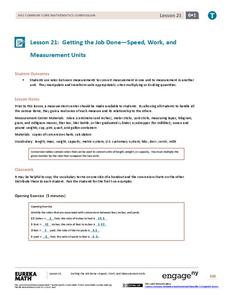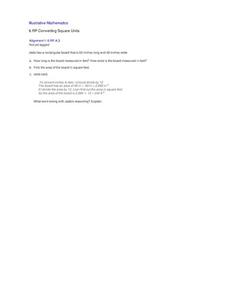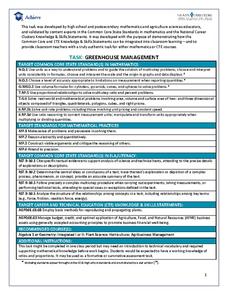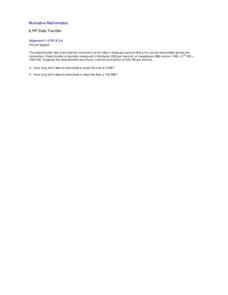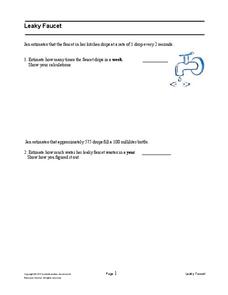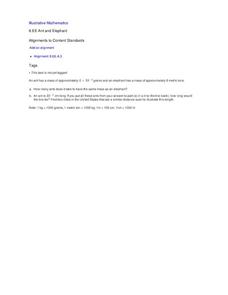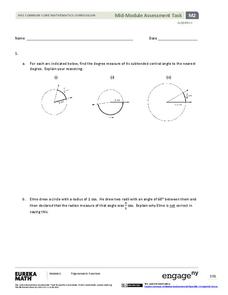EngageNY
Getting the Job Done—Speed, Work, and Measurement Units
How do you convert from one measurement to another? Pupils use unit rates to convert measurements from one unit to another in the 21st segment in a 29-part series. They convert within the same system to solve length, capacity,...
EngageNY
Comparison Shopping—Unit Price and Related Measurement Conversions
Speed up your scholars' understanding of ratios. Class members compare ratios related with speeds presented in different representations. They then use the unit rates to make the comparisons.
EngageNY
Conversion Between Celsius and Fahrenheit
Develop a formula based upon numerical computations. The 31st part of a 33-part unit has the class determine the formula to convert a temperature in Celsius to a temperature in Fahrenheit. They do this by making comparisons between the...
EngageNY
Problem Solving Using Rates, Unit Rates, and Conversions
Find a way to work with rates. The 23rd part in a 29-part series presents work problems for the class to solve given work rates. Pupils compare rates to determine which is faster. Some problems require learners to convert the rates to...
EngageNY
Comparison Shopping—Unit Price and Related Measurement Conversions II
Which rate is greater and by how much? Pupils continue to compare rates to solve problems in the 20th portion of a 29-part series. Rates are presented in a variety of representations either using the same representation or different...
Illustrative Mathematics
Currency Exchange
Take your class on a North American adventure with a currency conversion problem. Pupils are asked to change US dollars into Canadian dollars and then to Mexican pesos. The commentary includes two solutions, converting by unit rates and...
Illustrative Mathematics
Temperature Conversions
Complete two conversions at once using compositions. Pupils use the conversion formulas for temperatures to calculate a formula to convert directly between Kelvin and Fahrenheit. Classmates determine the meanings of composition...
Balanced Assessment
Blirts and Gorks
Start a trend by using blirts and gorks as your standard unit of measures. The activity asks learners to take a known measures of blirts and gorks and develop a conversion ratio. Individuals use both perimeter and area measures of...
Mathed Up!
Conversion Graphs
After watching a video on conversions, learners convert meters to feet, dollars to pounds, pounds to Euros, gallons to liters, and kilometers to miles. Then, they graph the conversion changes onto graph templates.
Concord Consortium
Summertopia
What if the unit of money changes tomorrow? Would you be prepared? Learners calculate currency conversions using fictional units of money. The fictional unit's base is 60 rather than 100, which can connect to time or even degrees.
Achieve
Yogurt Packaging
Food companies understand how to use math to their advantage. Learners explore the math related to the packaging and serving size of yogurt. They then use unit analysis and percent values to make decisions on the product development.
Illustrative Mathematics
Converting Square Units
Jada has a rectangle board that is measured in inches. Young learners confirm their understanding of converting inches to feet. Then they find the area in square feet. Jada thinks she has a short-cut to convert inches square to square...
Illustrative Mathematics
Floor Plan
A multi-step problem has learners finding the actual area based on a scale drawing and then converting units at the end. Two different solution choices are listed depending on the preference on which step to start first. Both methods can...
Achieve
Greenhouse Management
Who knew running a greenhouse required so much math? Amaze future mathematicians and farmers with the amount of unit conversions, ratio and proportional reasoning, and geometric applications involved by having them complete the...
Curated OER
Dental Impressions
What an impressive task it is to make dental impressions! Pupils learn how dentists use proportional reasoning, unit conversions, and systems of equations to estimate the materials needed to make stone models of dental impressions....
Charleston School District
Review Unit 8: Geometry Applicaitons
Pupils complete a review worksheet that highlights the key problems from the first eight lessons in the series. Topics include the Pythagorean Theorem and its converse, as well as finding volume of three-dimensional figures.
Illustrative Mathematics
Data Transfer
A question to ask your class is, How fast is your Internet? That depends on the data transfer rate (DTR), which is the unit rate used in this activity. Math students will calculate how long it takes to download a music file and a video...
Mathematics Assessment Project
Yogurt
Daily production of dairy? Determine profit and production requirements for a yogurt company with unit conversions and percentages to solve problems.
Mathematics Assessment Project
Leaky Faucet
In the assessment task, learners investigate the rate at which a faucet leaks. They use unit conversions to determine the amount of water that leaks in a year. Maybe they should just fix the leak!
Illustrative Mathematics
Computing Volume Progression 3
Learners are given a volume of a rectangular tank and are asked to find the water height. Because the total volume of the tank is given in liters, your geometers will need to use a unit ratio to convert to centimeters cubed. The exercise...
Curated OER
Ant and Elephant
Have you ever wondered how many ants make up an elephant? Inquisitive minds will be amazed as they use scientific notation to compute and compare the mass of an elephant to an ant. Have participants make guesses and see how close they...
EngageNY
Algebra II Module 2: Mid-Module Assessment
Time for classes to show what they've learned. Use several tasks to assess understanding of the trigonometric functions, unit circle, radians, and basic trigonometric identities.
Curated OER
How Fast is Usain Bolt?
Revisit the 2012 Summer Olympics by having seventh graders calculate the unit rate sprinting speed of the 100-meter gold medal winner.
Illustrative Mathematics
Dana's House
Your class is to find the percent of the lot that is not covered by a house. Make sure your pupils understand the problems before they begin. The lot is the whole of the percent problem and the house is the part. The exercise is good...
